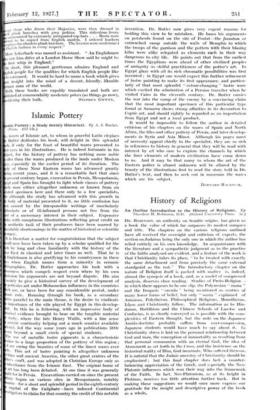History of Religions
An Outline Introduction to the History of Religions. By Theodore H. Robinson, D.D. (Oxford Uniti•er:sity Press. 5s.)
Da. ROBINSON, an authority on Semitic origins, has given us a book the value of which far surpasses its modest compass and title. The chapters on the various religions outlined have all received the oversight and criticism of experts, the section onJudaism being the only one in which the author has relied entirely on his own knowledge. An acquaintance with the literature and a sympathetic judgment as to the practice of the faiths analysed are evident, and a feature of the work is that Christianity takes its place, " to be treated with exactly the same detachment and from precisely the Sallie external standpoint as the rest." The Introductory chapter on the nature of Religion itself is packed with matter is, indeed, almost the synopsis of a book, and, as a model of compressed analysis, deserves close reading. Studies of Preto-Religion--- in which there appears to be one slip, the Polynesian mana " and the Iroquois " orenda " being mentioned as centres of many lower forms of belief, but only " mana " explained of Animism, Polytheism, Philosophical Religions, .Monotheism. Islam and Christianity follow. The information as to Hin- duism, Buddhism and the Chinese Schools of Lao-tse and Confucius, is as clearly conveyed as is possible with the com- plexities of Eastern thought, but the note on the Japanese Amida-doctrine probably suffers from over-compression, Japanese students would have much to say about it. In Christianity stress is laid on the personal relationship between God and man, the conception of immortality as resulting from that personal communion with an eternal God, the idea of Atonement as set forth in the Cross, and the insistence on the historical reality of Him, God incarnate, Who suffered thereon. It is natural that the Judaic ancestry of Christianity should be emphasized ; but this final chapter does luck a counter- balancing appreciation of the Greek, and especially the Neo- Platonic influences which won their way into the framework of the Faith. In fact, Neo-Platonism, co at its height in Plotinus, receives too little attention further back. But in making these suggestions we would once more express our gratitude for the insight and descriptive power of the book as a whole.










































 Previous page
Previous page